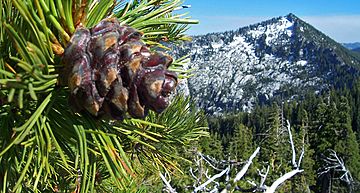Russian Peak facts for kids
Quick facts for kids Russian Peak |
|
|---|---|

Whitebark pine and Russian Peak
|
|
| Highest point | |
| Elevation | 8,199 ft (2,499 m) NAVD 88 |
| Prominence | 2,230 ft (680 m) |
| Geography | |
| Location | |
| Parent range | Klamath Mountains |
| Topo map | USGS Eaton Peak |
Russian Peak is a tall mountain located in the Klamath Mountains of California. It is part of a smaller group of mountains called the Salmon Mountains. These mountains form a horseshoe shape around the start of the Salmon River.
Russian Peak is the highest point in the Russian Wilderness. This wilderness area covers about 12,700 acres (51 square kilometers). It is known for its beautiful subalpine lakes and amazing plant life.
Discovering Unique Trees
Scientists became very interested in Russian Peak in the 1970s. Two researchers, Dale Thornburgh and John Sawyer, started studying the plants there. They made an exciting discovery: they found the first groups of subalpine fir trees ever seen in California.
What made this area even more special was the huge variety of other cone-bearing trees, called conifers. After several years of research, Thornburgh and Sawyer found 17 different types of conifers in just one square mile below the peak!
Types of Conifer Trees
The 17 conifer species they found include:
- Foxtail pine
- Whitebark pine
- Western white pine
- Jeffrey pine
- Ponderosa pine
- Lodgepole pine
- Sugar pine
- White fir
- Shasta fir
- Subalpine fir
- Engelmann spruce
- Brewer spruce
- Mountain hemlock
- Douglas-fir
- Incense-cedar
- Common juniper
- Pacific yew
Later, in 2013, another scientist named Richard Moore found an 18th type: the western juniper.
Why So Many Trees?
Thornburgh and Sawyer created a special name for places like this: Enriched Stands of the Klamath Mountains. This means areas where many different conifers grow together, including some rare types.
They believed this amazing variety happens because the trees don't compete much with each other. Several things help reduce this competition:
- The area is part of a large mountain chain, the North American Cordillera. This chain connects to other ranges like the Cascade Range and Sierra Nevada. This allowed different tree species to move and spread over long periods.
- The area has many different climates and soil types, some rich in nutrients and some poor.
- Natural events like fires happen sometimes.
All these factors together create a perfect environment. They allow many different plant species, not just conifers, to thrive in a small area. With help from their students at Humboldt State University, Thornburgh and Sawyer eventually found over 400 different types of vascular plants around Russian Peak.
You can learn more about the trees in this region at Conifers of Northwest California.
 | James B. Knighten |
 | Azellia White |
 | Willa Brown |

